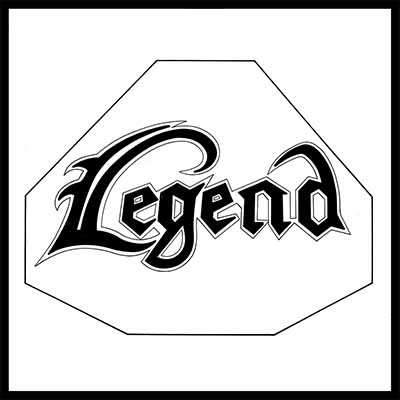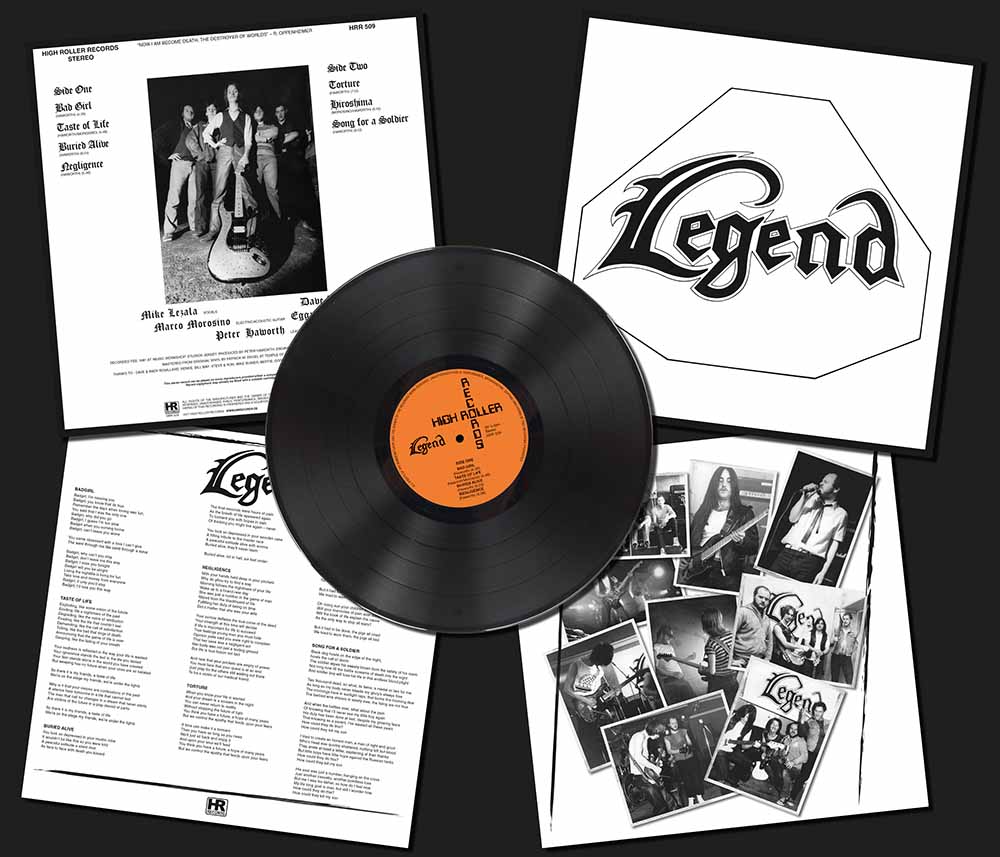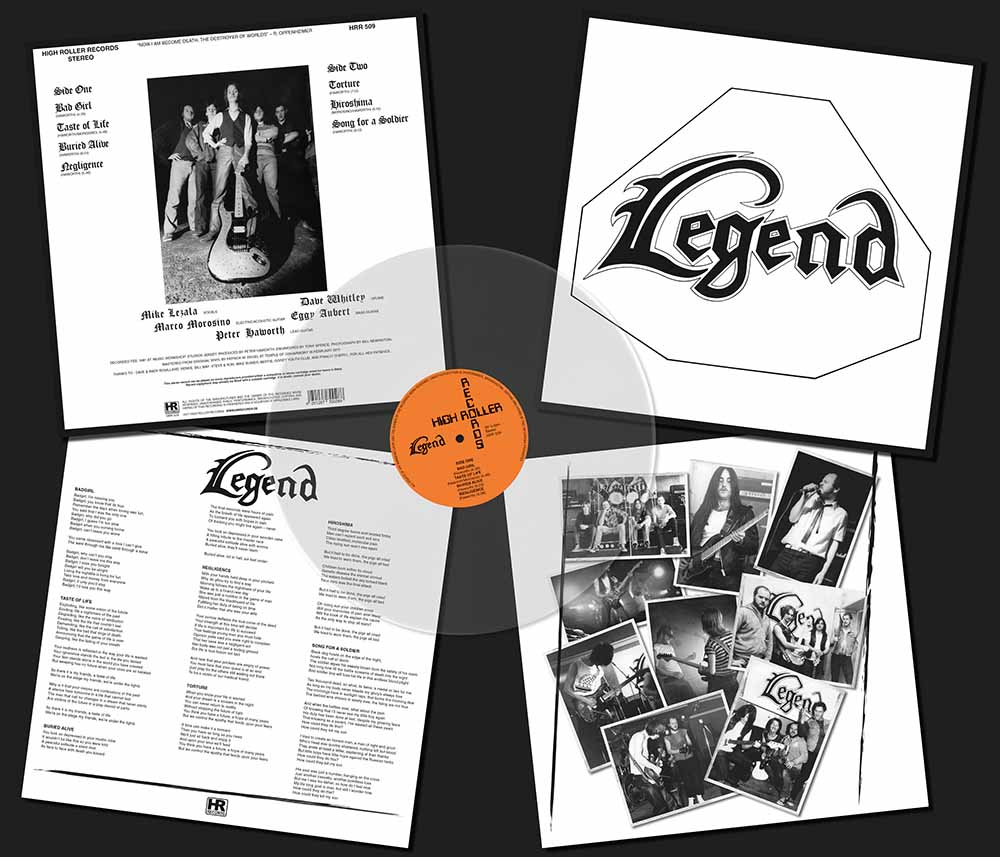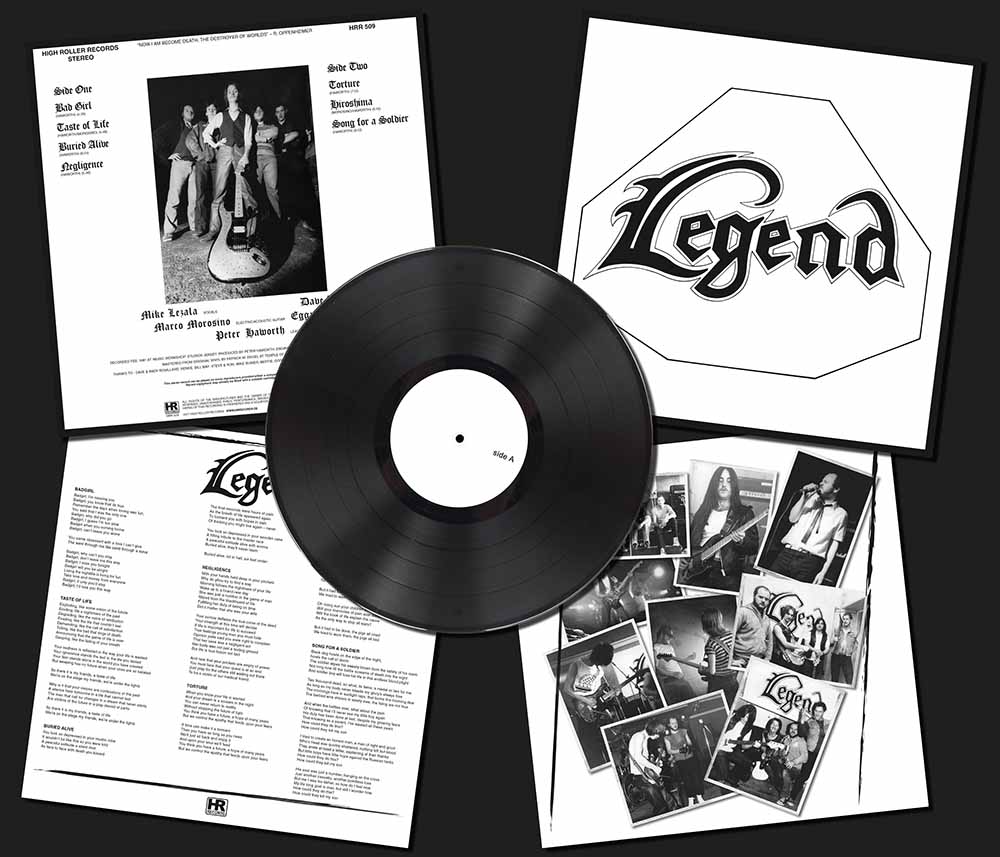 | ||||
| LEGEND - s/t LP | |
HRR 509, ltd 500, 200 x black + 300 x transparent ultra clear vinyl, 425gsm heavy cardboard cover, lyric sheet | |
| Mike Lezala - Vocals Peter Haworth - Guitars Marco Morosino - Guitars Eggy Aubert - Bass David Whitley - Drums | |
| 01 Bad Girl 02 Taste Of Life 03 Buried Alive 04 Negligence 05 Torture 06 Hiroshima 07 Song For A Soldier | |
SOLD OUT! | |
Mastered for vinyl by Patrick W. Engel at TEMPLE OF DISHARMONY in February 2017.
Legend from the British Channel Island Jersey are one of the most innovative bands of the glorious New Wave Of British Heavy Metal period. Pete Haworth (guitar) formed the group way back in August 1980. Along with similar acts such as Shiva, Omega or Bleak House, Jersey's Legend play a progressive yet very heavy style of traditional British metal.
Not being able to secure a record deal Mike Lezala (vocals), Marco Morosino (guitar), Eggy Aubert (bass), Dave Whitley (drums) and the mentioned Peter Haworth formed their own label Workshop Records and issued three records: »Legend« (1981), »Death In The Nursery« (1982) and a limited edition 12“ EP including four tracks (1982).
The band’s legendary debut album, which has become a precious collector’s item over the years, has now been officially re-issued on glorious vinyl by High Roller Records. Founding member Pete Haworth takes us back to the very beginnings of his musical career: “My first band was called Vortex, formed in 1976. We played hard rock covers: Kiss, Thin Lizzy, Ted Nugent, stuff like that. Then in 1978, I formed Dogwatch and started playing original material. We did a couple of demos, including one for EMI, but it was the time when punk rock exploded and none of the labels was interested in hard rock/metal. After that, in 1979, my next band was Dr Morbious, which was the embryo of Legend. It was when I first started playing with Dave Whitley (drums). Legend was formed not long after that in 1980. Stylistically, we've often been told we were a combination of Pink Floyd meets Black Sabbath, but I've not tried to be in any kind of box … just to be unique.”
Legend’s own style is indeed unique, maybe that’s the secret of their longevity? Pete Haworth seems to agree: “I was influenced by old school heavy rock and metal: Hendrix, Sabbath, Purple, Budgie etc., but also Pink Floyd, King Crimson, Frank Zappa and a lot of classical music. Eggy was Zeppelin, Mike was Roy Harper and singer guitarists. Dave was jazz drummers like Billy Cobham and Terry Bozio (Frank Zappa). So we really just did what we did and didn't think about copying anyone.”
Could Legend’s uniqueness somehow be associated with the fact that the band stems from Jersey, a pretty isolated place, nearer to France than to England? “No, I don't think so,” answers Pete Haworth. “Although we were isolated, we were all musicians and knew how to write songs and put on a show. We were limited by the number of venues, airplay and media coverage and the logistics of playing anywhere outside of the island. The Marquee gig we played in London was an enormous task. It's so much easier these days to play in another part of the world with the back line, drums etc. all being provided. To play these days you take your guitar and then play. In the early 1980s it was loading a van with all the gear, ten hours on a ferry to the UK, two-hour drive to London, band on a plane and hoping everyone arrived at the right time. And then soundcheck, playing the gig, Lemmy buying us drinks and taking us to a club in Soho, tough times. And the reverse journey to get home, stoned. If we'd have been based in London, I think we would not have been the undiscovered band that we became.”
How much tuned in with what was happening in England in the early eighties musically was the band after all? How many good record shops were there in places like St. Helier? “We had about three record stores in Jersey,” knows Pete Haworth. “But only one that would order imports, the others just stocked 'chart pop music'. I listened to so much music, and most of it was on import, discovered from the music press or pirate radio stations. And in Jersey I was the first to get »In Trance« (Scorpions), Frank Marino and Mahogany Rush, Budgie (first album) Groundhogs (»Split«) … Which was a big influence on me musically. Tony (TS) McPhee is an incredible British guitar player who again, is difficult to put into any sort of category. Blues, hard rock, metal, insane wammy bar antics, deep meaningful political songs. The Groundhogs were a major influence.”
Before the first album Legend never recorded any official demo tapes: “Just a lot of rehearsal recordings, including the night before we went into the studio. I wanted 'Hiroshima' to be longer as it was a major piece and 'Taste Of Life' with a longer intro, but there was not enough time on a vinyl album in those days. I got my wish eventually with the »Still Screaming« album (2003) which has the full version of Hiroshima and the extended version of Taste of Life on our »Dark Place« album (2013). 'Prisoner' was left out of the first album but we recorded it on the next album »Death In The Nursery«. (I actually wrote that whilst in Dogwatch in 1978).”
Legend financed their debut album all by themselves and also recorded locally. “Yes, it was totally self-financed,” confirms Pete Haworth. “All the other bands in the UK were releasing singles or EPs and we thought, we have the songs, let's do an album and see what happens. Initial run was 1,000. Then I think we did another 1,000 but the distribution company went bust and we've no idea what happened to them. It was only in later years that I found out that the first album had gone all over the world. Even Lars Ulrich managed to get a copy and taped it for all his mates.”
“Hiroshima” is one of the outstanding songs on an outstanding album: “Yes, it was a very CND time and as you know, Legend were always very social politically motivated. We knew all the other bands were singing about denim and leather and witches goblins and the devil, but at the time if there was something I felt I needed to write about, I did it. Mike would read the lyrics, listen to the music and it would just happen. His voice was amazing. So haunting, yet his ability to create multiple harmonies was breathtaking. And no computers involved, it was real. I guess I've always been anti-nuclear, the reasons behind Hiroshima and Nagasaki are maybe for another days discussion. 'The Pigs All Lied'. 'Song For A Soldier' was for my granddad. I would say, over 90% of every Legend song (about 70 so far) has a meaning for someone and that's why the lyrics are important. We've written songs about the bombings in Bali, 'Eden Massacre', the Omagh bombings in Northern Ireland (‘Maybe This Time’), children being trained to be suicide bombers (‘Born In Chaos’) 'Taste Of Life' … the list would be a long one and I prefer people to interpret the music as they wish. At least you can always hear what Mike is singing, quite rare these days.”
In “Song For A Soldier” it says “But little boys have little hope against the Russian tanks”, is this a song relating to World War II or maybe the original Afghanistan conflict? “World War I and II,” is Pete’s straight answer. “A tough thing to talk about, but it was how the Germans eventually sent boys out to fight towards the end of the war with little training or equipment and how a father must have felt. But it's the same all over the world … got a problem, go to war but we'll send some kid to fight it while we sit at home. Happened in both World Wars, Vietnam, and is happening right now. It's a ‘Song For A Soldier’, (basically an anti-war song), 'All Quiet On The Western Front', a great book and film if you ever get the chance to read it. The next album will probably contain more of the same depending on world events (unless I get visited by Satan and a bunch of witches …then we'll have a party).”
On the back cover of the album, there is a citation by Robert Oppenheimer saying “Now I am become death, the destroyer of worlds”, referring to nuclear armament and the horrors of the second World War? “I always remember watching a documentary about what the Americans did during the Manhattan Project and the testing afterwards,” states Pete Haworth. “I researched to try and discover the truth ... Bikini Atoll especially. The children thought it was snow … it wasn't. But I'm getting a bit deep now, so let's stick to the music. Most fans have no idea what the songs are about and that's the way it should be. Like looking at a painting in a gallery and imagining what it means, or reading a book and seeing the pictures in your mind. It's all subjective.”
Matthias Mader


